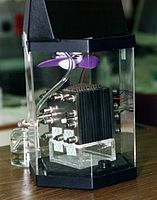
Photo from wikipedia
Abstract Solid oxide fuel cells (SOFCs) are highly efficient fuel-flexible energy conversion devices. In this review, we present the latest advances in the computational modelling of SOFC components. The combination… Click to show full abstract
Abstract Solid oxide fuel cells (SOFCs) are highly efficient fuel-flexible energy conversion devices. In this review, we present the latest advances in the computational modelling of SOFC components. The combination of first principle calculations and classical molecular dynamics (MD) simulations can provide an accurate and complete description of the materials being investigated — from their electronic structure and related properties to the thermodynamic and kinetics behind catalytic reactions or diffusion processes. Computational modelling is, therefore, an essential tool in developing or improving SOFC components, allowing researchers to predict, understand and explain the mechanisms behind the experimentally observed properties.
Journal Title: Current Opinion in Electrochemistry
Year Published: 2020
Link to full text (if available)
Share on Social Media: Sign Up to like & get
recommendations!